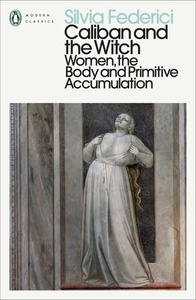You need to sign in or sign up before continuing.
Take a photo of a barcode or cover
challenging
dark
informative
slow-paced
There are a lot of super compelling ideas here- the relationship between enclosure and heretical movements, the conceptualization of the body-as-machine, the crises of the late medieval period as they relate to redefining gender and labor. There are also some very bold claims that I think aren't supported especially well. Federici is very invested in establishing the Witch Hunt on the podium of the Original Sins of the Modern West, alongside slavery and the genocide of the New World, which perhaps devalues those atrocities and reels a little of White Feminism tm. But what I think is really useful here is the rebuttal of the accepted history of the Witch Hunts as naive vestiges of a medieval barbarity- that they instead are as much a product of the Enlightenment, that they were a weapon of class warfare essential for creating the modern proletarian.
challenging
dark
informative
medium-paced
The most striking thing about this book is that it makes clear the sheer scale of the persecution of "witches". "Hundred of thousands of women were burned, hanged and tortured in less than two centuries". I hadn't realised that it was that bad. It was also news to me that Henry VIII hung 72 000 people.
Some of the terminology in the book was a bit unclear to me. "...reproductive capital: furniture, utensils". What does she mean by reproductive there? No idea.
I was also a little unconvinced by the argument that because the witch hunts took place at the same time as the rise of capitalism that they were a deliberate strategy to achieve capitalisms aims of enslaving the newly created working class. That reeks a little too much of global conspiracy theories for me.
An important point, which I had heard before but that is clearly detailed here, is that the full time housewife was only invented in the 19th century. Good to remember in the context of the resurgence of the idea that that is somehow a natural state of affairs.
An interesting and readable book on an aspect of history which is often overlooked.
Some of the terminology in the book was a bit unclear to me. "...reproductive capital: furniture, utensils". What does she mean by reproductive there? No idea.
I was also a little unconvinced by the argument that because the witch hunts took place at the same time as the rise of capitalism that they were a deliberate strategy to achieve capitalisms aims of enslaving the newly created working class. That reeks a little too much of global conspiracy theories for me.
An important point, which I had heard before but that is clearly detailed here, is that the full time housewife was only invented in the 19th century. Good to remember in the context of the resurgence of the idea that that is somehow a natural state of affairs.
An interesting and readable book on an aspect of history which is often overlooked.
Really solid historical and sociological text. Stylistically it reminded me a bit of David Graber, though thematically it was closer to "Waking the Witch" by Pam Grossman. Readers may also enjoy "Trust Kids" (which has an essay or two on the subjugation of women in western society by means of a rigid family structure and controlled reproduction) and "Fearing the Black Body" (which is not super similar thematically but has some historical crossover). As a side note, while this does eventually get around to mentioning "The Tempest" it is most definitely not primarily a work of literary analysis.
informative
reflective
tense
slow-paced
Despite the dense writing style, the book looks at a couple of important moments in history and interprets them in the light of feminism.
So, so fascinating and thought-provoking! What a humiliation it is to be a woman and/or to be poor.
informative
medium-paced
challenging
dark
informative
reflective
medium-paced
dark
emotional
informative
lighthearted
reflective
sad
medium-paced






